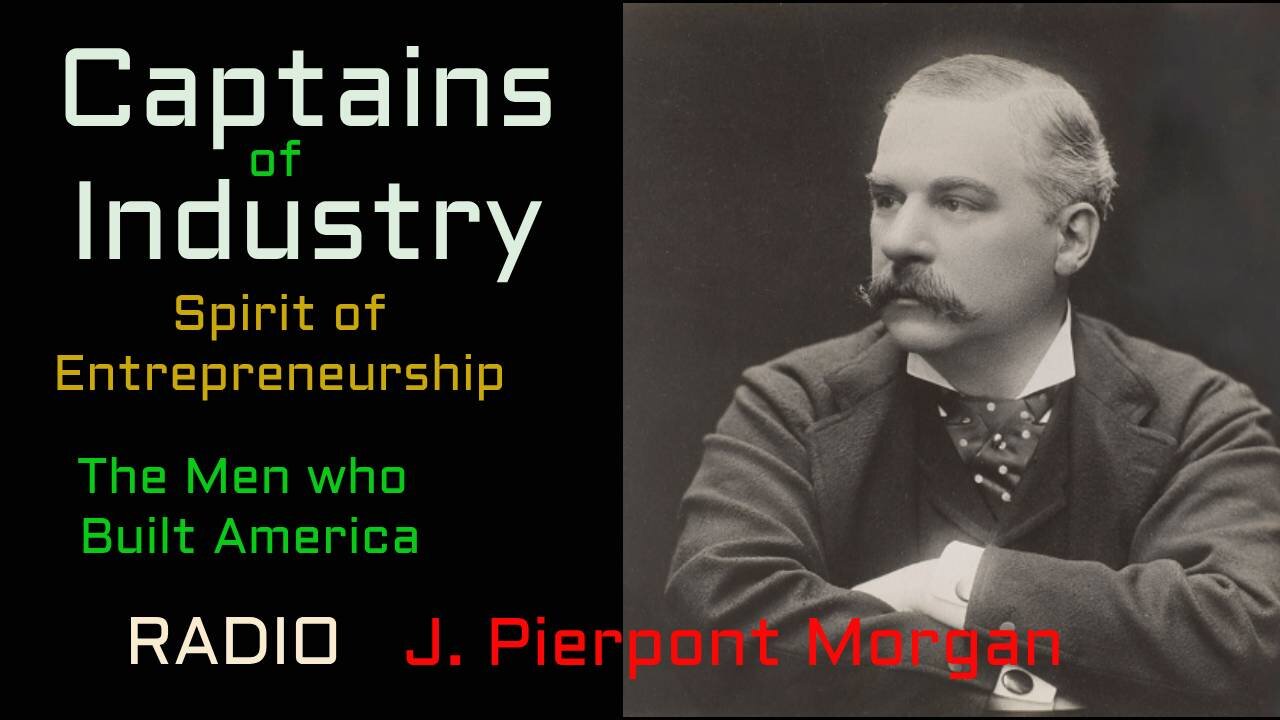Premium Only Content

Captains of Industry (ep22) J. Pierpont Morgan
John Pierpont Morgan (April 17, 1837 – March 31, 1913)[1] was an American financier and investment banker who dominated corporate finance on Wall Street throughout the Gilded Age and Progressive Era. As the head of the banking firm that ultimately became known as J.P. Morgan and Co., he was a driving personal force behind the wave of industrial consolidations in the United States at the turn of the twentieth century.
Over the course of his career on Wall Street, Morgan spearheaded the formation of several prominent multinational corporations including U.S. Steel, International Harvester, and General Electric. He and his partners also held controlling interests in numerous other American businesses including Aetna, Western Union, the Pullman Car Company, and 21 railroads.
Through his holdings, Morgan exercised enormous influence over capital markets in the United States. During the Panic of 1907, he organized a coalition of financiers that saved the American monetary system from collapse.
As the Progressive Era's leading financier, Morgan's dedication to efficiency and modernization helped transform the shape of the American economy. Adrian Wooldridge characterized Morgan as America's "greatest banker". Morgan died in Rome, Italy, in his sleep in 1913 at the age of 75, leaving his fortune and business to his son, John Pierpont Morgan Jr. Biographer Ron Chernow estimated his fortune at $80 million (equivalent to $2.4 billion in 2022).
J.S. Morgan & Co.: 1858–1871
Main article: J.S. Morgan & Co.
After completing his education, Morgan went to London in August 1857 to join his father, now a partner in the merchant banking firm George Peabody & Co.[a][9] For the next fourteen years, he worked as his father's American representative in a series of affiliated New York City banking houses, learning the trade and lifestyle of a bank partner: Duncan, Sherman & Company (1858–1861), his own firm J. Pierpont Morgan & Co. (1861–1864), and finally Dabney Morgan (1864–1872).
Pulitzer. Tiffany. Vanderbilt. Westinghouse. All names you may recognize but what do they have in common? They were all late 19th and early 20th century business men who were very successful, most of them making millions.
In the 1930s, as the United States and Canada were beginning the early stages of recovery from the Depression, Atlas Radio Corporation of Canada created the show Captains of Industry. The purpose of the show was to inspire people with the stories of these self-made men.
The show dramatized the lives of these men who were not just businessmen but philanthropists. The 15-minute shows highlighted the spirit of entrepreneurship each of these men possessed and the good things they did with their money. Over the course of the show, 52 North American businessmen were profiled.
-
 LIVE
LIVE
The Rubin Report
1 hour agoHost Gets Visibly Angry as His Trap for Trump Backfires
3,078 watching -
 LIVE
LIVE
The White House
1 hour agoPresident Trump Participates in a Cabinet Meeting, Apr. 30, 2025
1,664 watching -
 LIVE
LIVE
Benny Johnson
1 hour agoLIVE Trump Cabinet Meeting Right Now in White House, Trump Torching Media | Michelle Obama MELTDOWN
7,845 watching -
 UPCOMING
UPCOMING
The Shannon Joy Show
1 hour ago🔥🔥100 Day SHOCKER - Trump Is Deporting FEWER Illegal Immigrants Than Biden! He’s Also Pimping Biden’s mRNA & Fast Tracking Self-Amplifying mRNA Shots! With Special Guests John Beaudoin Sr. & Jessica Rose🔥🔥
94 -
 LIVE
LIVE
Right Side Broadcasting Network
3 hours agoLIVE: President Trump Holds a Cabinet Meeting - 4/30/25
5,031 watching -
 LIVE
LIVE
BitLab Academy
2 hours agoCrypto DIP ALERT! Bitcoin & Atcoins: Sell In May? Crypto Pump or Dump Next!?
123 watching -
 LIVE
LIVE
Dr David Jockers
1 hour agoHow Sourdough Bread Impacts Blood Sugar and Gut Health!
59 watching -
 1:00:37
1:00:37
VINCE
3 hours agoMedia Lies On Trump's 100 Days | Episode 33 - 04/30/25
150K90 -
 LIVE
LIVE
Badlands Media
9 hours agoBadlands Daily: April 30, 2025
4,259 watching -

Wendy Bell Radio
7 hours agoIt's The Trump Show
58K45